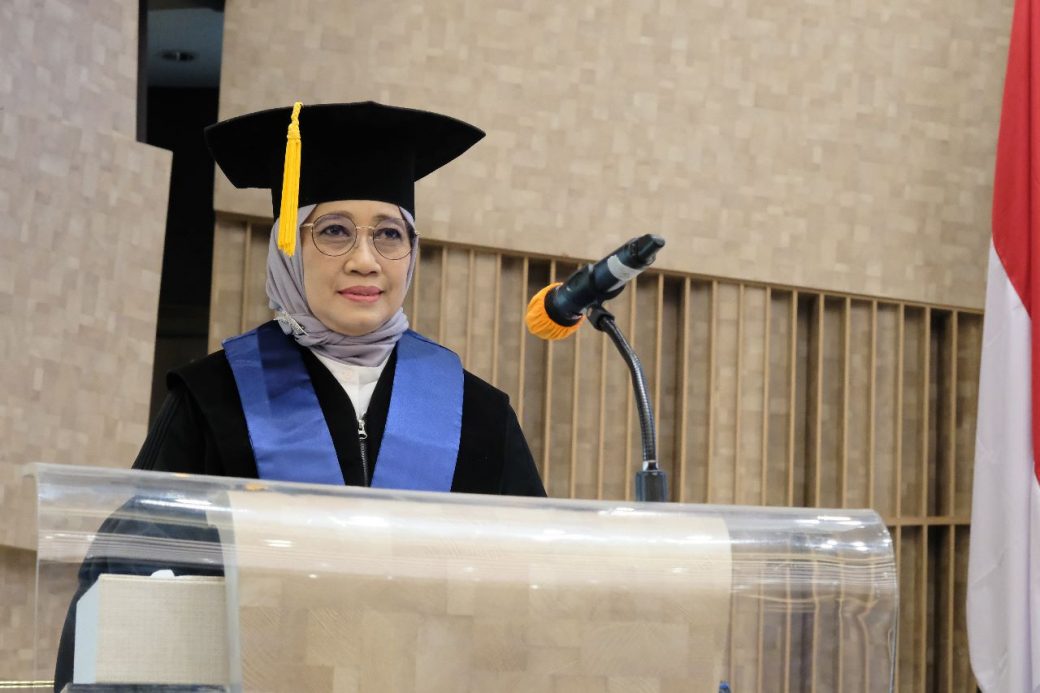Corrosion events that damage metal structures continue to occur and cause losses. From an economic point of view, many losses are experienced each year due to corrosion events. Rini Riastuti, Permanent Professor in the Field of Corrosion, Faculty of Engineering, Universitas Indonesia (FTUI), inaugurated by the Rector of Universitas Indonesia (UI) on Wednesday (05/07/2023) this morning, mentioned the losses suffered due to the corrosion incident. This was conveyed in his inaugural speech, which took place at Makara Art Centre UI, Depok Campus, West Java.
Corrosion is known to laypeople by the term rust. Metal corrosion occurs due to a decrease in the quality or destruction of the metal surface in an aggressive environment in the form of liquids, gases, or soil. According to Rini, corrosion causes the visual appearance of objects to deteriorate, and the industry experiences plant downtime because it has to replace corroded equipment. Corrosion also causes a loss of product due to leaks in containers, tanks, or piping, as well as a loss of efficiency because the industry incurs high costs.
In addition to economic losses, metal corrosion can also cause contamination that is detrimental to health. For example, if a can of food packaging is dented, the food inside will be contaminated with the white tin layer that has peeled off. Therefore, it is necessary to make efforts to control and inhibit the corrosion reaction.
Several attempts can be made to control and inhibit the corrosion reaction. First, through the use of safe inhibitors. Inhibitors are chemical substances (organic and inorganic) that are added to the system in small amounts and form a passive layer on the surface of the metal to be protected. Usually, inhibitors are in the form of liquids or vapours, which are used in water and oil or gas transportation pipes.
“Currently, students of the Department of Metallurgy and Materials at FTUI are doing a lot of research on the use of plants, both leaves, fruit, and bark, to be used as inhibitors. Examples that have been studied are betel leaves, green tea leaves, white tea leaves, soursop leaves, red spinach leaves, jamblang fruit, secang wood, mangosteen rind, and many more. All of these materials contain polyphenolic and anthocyanin substances as high antioxidants, which are expected to become environmentally friendly inhibitors,” said Rini.
Efforts to prevent metal corrosion can also be done by coating methods such as electroplating, galvanization, and organic coating (paint). The coating provides a barrier to prevent water and oxygen from coming into direct contact with the iron surface. In addition, metal protection with cathodic protection methods can be an option for large industries. This method can be carried out by using a sacrificial anode or impressed current.
Rini assesses that the corrosion process never stops. For this reason, there is a need for socialisation related to corrosion, starting with the level of education, the functions of the personnel needed, as well as courses and training on corrosion cases. There are four categories identified by the European Federation of Corrosion (EFC) for personnel dealing with corrosion cases. Category A: Corrosion Scientists and Engineers, namely those involved in the development of techniques and methods regarding the corrosion mechanism of personnel, such as chemists, metallurgists, physicists, researchers, and practitioners. Categories B and C: Corrosion Technologists and Technicians, namely those who collaborate directly with scientists, have an understanding of basic scientific principles, and can apply them. Finally, category D: Operatives, namely personnel who carry out tasks in the field under the supervision of corrosion engineers
“In addition, it is very important to practise virtually all risk-based corrosion control. Usually, it is initiated by identifying the main mechanisms of corrosion attack and then making reasonable interventions. This could include changing materials, selecting corrosion inhibitors, or changing component designs or expected physical conditions. The critical stage varies to analyse corrosion, often with a modelling approach,” said Rini, concluding her presentation.
Through a study entitled “Corrosion Never Sleeps: Corrosion Events Around Us”, Prof. Dr. Ir. Rini Riastuti, M.Sc., was successfully inaugurated as a Permanent Professor in the Field of Corrosion at FTUI. The inauguration procession was led directly by UI Chancellor Prof. Ari Kuncoro, S.E., M.A., Ph.D., and broadcast virtually via the Universitas Indonesia’s YouTube channel and UI TV. The chairman of the RI MPR constitutional review commission and member of the RI National Energy Council, Ir. H. Daryatmo Mardijanto; Senior Vice President Director of PT Honda Prospect Motor, Benawati Abas; Professor of the Bogor Agricultural Institute, Prof. Dr. Ir. Sedarnawati Yasni, M. Agr.; and UI Chancellor for the 2014–2019 period, Prof. Dr. Ir. Muhammad Anis, M. Met.
Prof. Dr. Ir. Rini Riastuti, M.Sc., completed his Bachelor of Engineering from UI (1978–1985); Master of Science, Faculty of Technology, The Victoria University Of Manchester, UK (1989–1990); and Doctor of Metallurgy and Materials Engineering Study Programme, FTUI (2008–2014). Several of his published scientific works, namely Effect of Syzygium Cumini Leaf Extract As a Green Corrosion Inhibitor on API 5L Carbon Steek in 1M HCl (2022); Development of Saga (Abrus Precatorius) Seed Extract as a Green Corrosion Inhibitor in API 5L Grade B under 1M HCl Solutions (2022); and Study of Influence Time in the Improvement of Nickel Contents on Limonite Processing Using Naoh (2022),
***
Bureau of Public Communications
Faculty of Engineering, Universitas Indonesia

